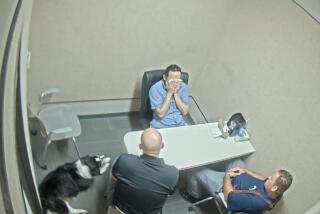Dilemma Rises in Mercy Killing Attempt
Kenneth Lee Shadell probably thought the pain and suffering were finally ending as his wife of 43 years, unable to speak and paralyzed by a stroke, slipped into a drug-induced coma Monday night.
Elizabeth Shadell lay in bed, with no pulse, when the retired Grossmont College geography professor picked up his phone, called the 911 emergency number and said simply, “I just helped my wife die.”
Shadell, 67, summoned the La Mesa police, the coroner and an ambulance.
But when paramedics and police officers arrived at the couple’s Skyline Lane home, they administered cardiopulmonary resuscitation on Mrs. Shadell, revived her pulse and respiratory system, and saved her life.
Then they arrested her husband on suspicion of attempted murder.
Elizabeth Shadell was comatose and close to death at Grossmont Hospital Wednesday night, according to her son. In downtown San Diego, her husband was spending his third night in County Jail as the district attorney agonized over whether he should be charged--and whether his office should prosecute the first so-called “mercy killing” case in the county’s history.
“It’s one of those that’s tough to call,” said La Mesa Police Detective Mike Murphy, who headed the department’s investigation of the case and was due to report his findings to the district attorney this morning. “That’s why we get the facts and present it, and let someone else make the determination and proceedings.”
Officers found two prescription bottles--one for the tranquilizer Valium--at the foot of Elizabeth’s bed. Hospital officials have refused to comment on the woman’s condition, but the couple’s son said that Mrs. Shadell was treated for an overdose of drugs.
Linda Miller, a spokeswoman for the district attorney’s office, said a decision on whether to prosecute Shadell probably would be made today. Because no charges have been filed, bail has not yet been set. “No one can remember prosecuting a mercy killing before in San Diego County,” she said. “There have been a number of murder-suicides involving elderly people, but never a situation in which we had to decide whether charges should be filed.”
Waiting for word at the Shadells’ La Mesa home Wednesday was their son Jim, a 40-year-old postman from Durango, Colo. He said he had had several brief, emotional phone conversations with his father and had visited Grossmont Hospital, where he has faced a grim prognosis on his mother’s chances to survive.
“I have no idea why this happened now,” he said. “But I know one thing--Dad thought he was doing the best thing for her. Her illness has been a terrible strain for him. His love for her was beyond imagination, and he couldn’t stand to see her pain.”
For the first 59 years of her life, Elizabeth Shadell was an active, vibrant woman described as “hearty” by her son.
“There are a lot of great people in the world, “ Jim Shadell said, “but she was sure one of them.”
As her husband made his mark in the Air Force (he retired as a lieutenant colonel) and later in academics, Elizabeth concentrated on her three children, particularly the youngest son, who is mentally handicapped. She also was active in charity work for organizations aiding the handicapped.
“She was really proud of her family,” said her son. “I feel really alone as I try to deal with this.”
The couple’s daughter, who is 42, works at a U.S. Foreign Service office in the African nation of Djibouti. The retarded son, who lives in San Diego County, is 38.
In 1978, four years after the couple moved to La Mesa and began making plans to settle into retirement, Elizabeth was struck with a severe asthmatic condition, and her health began a steady deterioration. In 1982, Kenneth retired from Grossmont College, and since then has spent much of his time caring for his wife, a painful ordeal made more frustrating by her steady decline.
“Dad took her to the hospital under life-threatening conditions so many times we finally lost count,” Jim Shadell recalled. “It was excruciating when she had such horrible trouble breathing.”
Eight months ago, shortly after one of those asthma attacks, Elizabeth suffered a severe stroke, paralyzing her right side and leaving her unable to speak. She has been bedridden ever since.
Although she could no longer speak, Jim said it was wrong to say his mother could no longer communicate.
“She never lost her emotions or her ability to reason,” Jim said. “And that made it even more of a strain, because facially, she could express the pain she was feeling. She didn’t communicate in the standard way. But you could talk to her and she would understand. And by moving her left arm and making whatever gestures she could, she tried to talk back.”
Shadell said he has not been allowed to visit his father in jail, although he has received several short phone calls from him.
His voice breaking as he began to weep, Shadell said the telephone calls “usually end up like this . . . .”
After a pause, he said, “This is so trying for all of us. Our suffering has only gotten worse.”
Shadell said he harbors no bitterness toward the law enforcement officials who have placed his father behind bars or the district attorney’s office that must decide now whether an act of love is also murder.
“It offends me personally, but right now it falls into a category where they have to do their jobs,” he said.
“Those people just don’t know my father. I can’t expect them to understand all of this like I do.”
More to Read
Sign up for Essential California
The most important California stories and recommendations in your inbox every morning.
You may occasionally receive promotional content from the Los Angeles Times.









